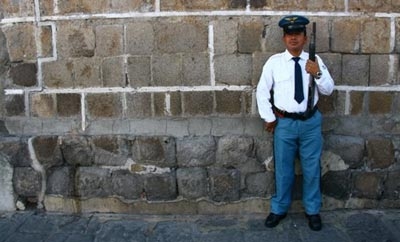The private security sector in Central America is large and growing fast, raising concerns about the lack of proper oversight of the industry as well as the shortage of resources for law enforcement in the region.
According to an AFP report, the Northern Triangle countries of Guatemala, El Salvador and Honduras have the largest concentration of private security firms in the region. The news agency cites figures recently released by the Pan-American Private Security Federation (FEPASEP), which put the number of private security personnel in Central America at more than 200,000.
Security analyst Omar Garrido told the AFP that the figure could be even higher, with that number of private security personnel employed in the Northern Triangle alone, and more than 300,000 in the region as a whole.
The investigation found that security guards outnumber police in Guatemala by a factor of four to one. In Honduras, the most violent nation in the world in terms of its homicide rate, there are more than twice as many private security personnel as police officers (29,000).
Even in Costa Rica, considered a bastion of relative security and rule of law in Central America, there are twice the number of security guards as the 13,000 police.
What’s more, the demand for these services is on the rise. According to the AFP, the private security industry in the region overall is growing by 8 percent annually.
InSight Crime Analysis
One of the main concerns about the private security industry in Central America is that it lacks proper regulation, and that guards could be involved in illegal activities. In Honduras, for instance, security guards have been linked to violence in the land conflict in the Bajo Aguan region. According to international and domestic human rights groups, these guards intimidate and clash with locals at the behest of large-scale agro companies.
In El Salvador — where there are some 25,000 private security personnel compared to the national police force of 20,000 — the role of private security has come under scrutiny for suspected links to the illicit arms trade. In 2011, the government announced that more than 1,700 firearms used by private security companies since 2009 had been sold on the black market after being reported missing.
Authorities have demonstrated increasing interest in regulating the industry in Guatemala, where military personnel have been accused of coordinating with private security firms in so-called Illegal Clandestine Security Apparatuses (CIACS) in the past, often in the interests of powerful drug trafficking networks. In 2010 the government passed a law which required security firms to register with the state and explicitly prohibited active duty military personnel from working with private companies in any form. However, as of February only two of the 150 registered security firms in the country had even begun the registration process.
Despite the issues associated with private security firms in Central America, they may be a necessary tool for companies doing business in the region, which often find themselves besieged by threats and violent crime. In the Honduran capital of Tegucigalpa, for instance, more than 90 percent of businesses report having experienced threats, mostly in the form of attempted extortion. Police forces in the region often lack the resources to properly shield the private sector from these criminal forces, giving rise to the demand for private security.
The situation has taken a toll on the economic health of the region. World Bank analysts estimate that violence in Honduras alone costs the country some 10 percent of its annual gross domestic product (GDP).
Yet despite the heavy cost of crime to the economy, business associations and economic elites have remained largely opposed to attempts by governments in the region to institute “security taxes” intended to boost funding for anti-crime efforts.

